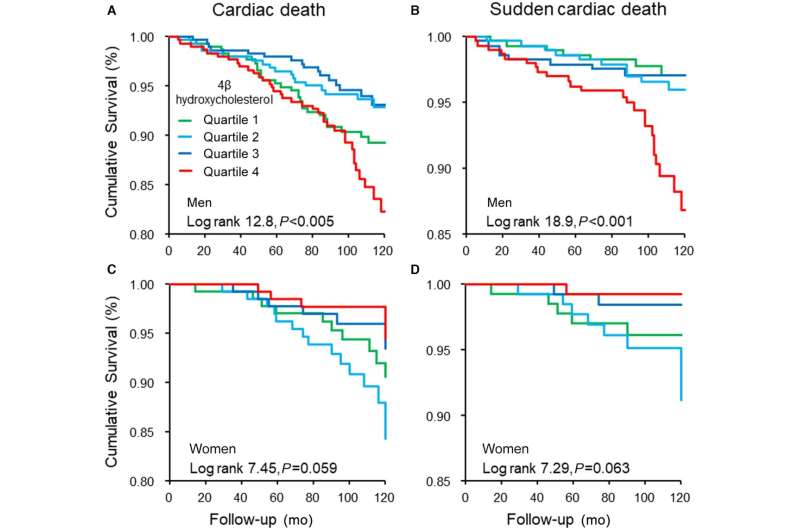This article has been reviewed according to Science X's editorial process and policies. Editors have highlighted the following attributes while ensuring the content's credibility:
fact-checked
peer-reviewed publication
trusted source
proofread
Research discovers promising biomarker for sudden cardiac death in men

Plasma 4β-hydroxycholesterol (4βHC) measurement could offer a possibility to predict and prevent sudden cardiac deaths in men with coronary artery disease, according to a study by the University of Oulu.
The study found that high levels of 4βHC were associated with total mortality, cardiac mortality and especially sudden cardiac death in men. The significance of 4βHC levels has not been previously studied in patients with coronary artery disease. The results are published in the Journal of the American Heart Association.
Coronary artery disease is a common disease among Finns and one of the world's most important causes of sudden cardiac death. Most often, sudden death related to coronary artery disease occurs completely unexpectedly, and there are no effective ways to anticipate it.
The University of Oulu's research group of internal medicine investigated whether plasma 4βHC could act as a prognostic factor in coronary artery disease and its adverse cardiac events. 4βHC is secreted into the bloodstream from the liver, where it is produced from cholesterol. The research group has previously studied the role of the compound in obesity-induced hypertension, for example.
The study revealed that high levels of 4βHC were associated with sudden cardiac death in men. Men with the highest level of 4βHC had a fourfold risk of sudden death.
The result is surprising for two reasons. First, both women and men who were the healthiest had the highest levels of 4βHC. They had the lowest body mass index, the least diabetes and the best physical performance. Second, high levels of 4βHC predicted sudden deaths only in men but not in women, who on the contrary were protected from cardiac mortality and sudden cardiac death by high levels of 4βHC.
Professor of Internal Medicine Janne Hukkanen, the leader of the study, says, "In this study, fit men died of sudden cardiac death if they had a high level of 4βHC, whereas fit women with a high level of 4βHC were not harmed, rather they seemed to benefit. This gender difference is a very surprising and significant finding."
4βHC is a cholesterol derivative that activates the liver X receptor (LXR), which is expressed in the liver as well as in the heart. "Some previous studies have suggested that LXR's function differs between women and men with coronary artery disease," Hukkanen adds.
The new research finding must be confirmed by a sufficiently long follow-up in other research data sets of patients with coronary artery disease, according to the researchers. "We are at the edge of very exciting results. If the finding can be confirmed, we may be able to prevent sudden cardiac deaths better in the future," Hukkanen says.
The study is based on the ARTEMIS cohort, which was collected from patients with coronary artery disease treated at Oulu University Hospital. All patients in the cohort have coronary artery disease diagnosed by coronary angiography. A total of nearly 2,000 patients have been enrolled in the cohort. The average follow-up time for patients participating in the study was almost nine years.
More information: Roosa Rahunen et al, Liver X Receptor Agonist 4β‐Hydroxycholesterol as a Prognostic Factor in Coronary Artery Disease, Journal of the American Heart Association (2024). DOI: 10.1161/JAHA.123.031824





















